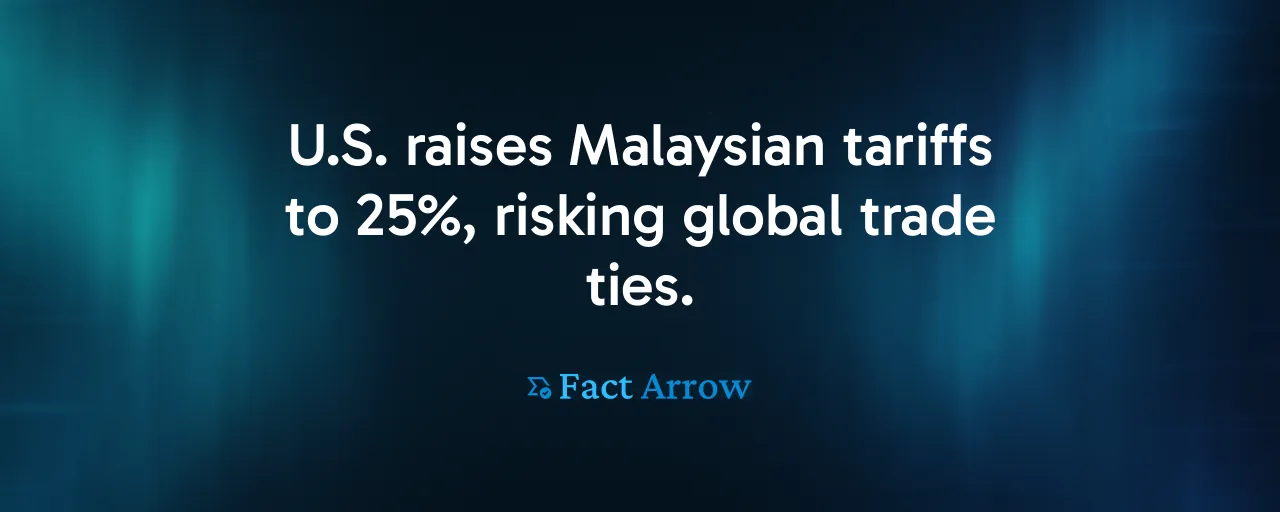A New Tariff Threat Emerges
On July 8, 2025, Malaysia's trade ministry clarified a looming U.S. policy shift. A 25 percent levy on Malaysian exports, set to begin August 1, will replace the current 10 percent tariff, not stack on top of it. The announcement corrected earlier confusion from a Malaysian minister who suggested a steeper 35 percent hike. While the clarification eases some fears, the tariff itself signals a broader U.S. push toward protectionism, raising questions about its impact on American consumers and global trade partnerships.
The Cost of Protectionism
Tariffs sound like a tool to level the playing field, but they often hit American wallets hardest. Research from the Peterson Institute shows that 60 to 80 percent of tariff costs get passed to U.S. consumers through higher prices. For Malaysian goods like electronics and palm oil, which dominate $43.7 billion in annual imports, this means pricier smartphones, car parts, and even cooking oil. Low-income shoppers, already stretched thin, face the brunt of these increases. Meanwhile, U.S. retailers and manufacturers reliant on Malaysian inputs grapple with shrinking margins or passing costs to customers.
The ripple effects extend beyond price tags. Malaysia's export-driven economy could lose $3 billion annually, threatening 30,000 jobs in its manufacturing hubs like Penang and Johor. Small businesses, especially in rubber gloves and palm oil derivatives, face margin squeezes that could force layoffs. In the U.S., downstream industries like solar panel assembly, which depend on Malaysian components, risk delays in clean-energy projects. These disruptions undermine shared goals in innovation and sustainability.
Straining Global Bonds
Malaysia ranks as the U.S.'s second-largest trade partner in ASEAN, with two decades of integrated supply chains. Unilateral tariffs jeopardize this relationship at a time when cooperation is vital to counterbalance China's influence in Asia. The U.S. risks alienating a key ally in the Indo-Pacific Economic Framework, a platform designed to foster shared prosperity. If Malaysia retaliates with its own tariffs, American farmers exporting soy or wheat could face losses, echoing the fallout from past trade spats.
History offers a reminder of trade's delicate balance. In 2018, U.S. steel tariffs under Section 232 sparked global pushback, with limited economic gains. Malaysia secured minor exemptions then, but today's broader 25 percent levy feels like a step backward. The World Trade Organization, though slow to enforce, remains a better venue for resolving disputes than tariff brinkmanship. Sidestepping multilateral channels weakens the rules-based order that benefits both nations.
A Fairer Way Forward
Instead of punitive duties, the U.S. could prioritize negotiation. The Indo-Pacific Economic Framework offers a platform to address trade imbalances without escalating costs. Malaysia has shown willingness to engage, joining the framework in 2021. Targeted talks could secure better market access for U.S. firms while preserving Malaysia's role in global supply chains. For instance, tariff-rate quotas for palm oil or semiconductors could stabilize prices without blanket penalties.
At home, expanding trade-adjustment assistance would help U.S. workers and businesses adapt to global shifts. Joint labor and environmental standards, developed through cooperation, could align both nations' priorities without punishing vulnerable communities. Malaysia's expertise in semiconductor packaging, critical for medical devices and defense, makes partnership more strategic than confrontation. A verification system to prevent transshipment of Chinese goods could address U.S. concerns while keeping trade flowing.
Reflecting on Trade's True Stakes
The U.S. tariff on Malaysia represents a choice between isolation and collaboration, extending beyond a mere policy tweak. Higher costs for Americans, strained alliances, and job risks abroad signal the limits of protectionism. Cooperative trade policies, rooted in mutual gain, offer a stronger path to prosperity. The August 1 deadline looms, but there's still time to choose dialogue over duties.
Consumers, workers, and businesses on both sides deserve better than a trade war's collateral damage. By prioritizing fair negotiations and shared standards, the U.S. can strengthen its economy without weakening its partners. Global challenges like climate change and technological innovation require unity rather than division.
As trade tensions simmer, the question remains: will the U.S. double down on tariffs or rebuild trust with allies? The answer will shape prices at the store, and it will also determine the future of global cooperation. For now, Americans and Malaysians alike await a resolution that puts people over politics.
